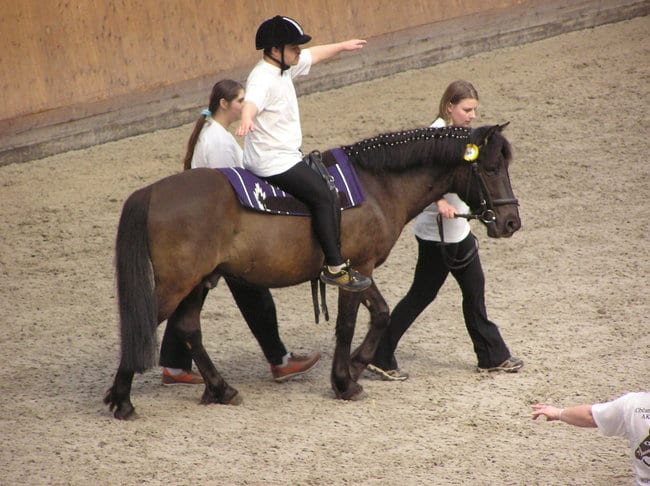With a Little Help From My Friends

Children with cerebral palsy can benefit from multiple forms of treatment. Depending on the child’s type of cerebral palsy and its severity, there are multiple treatment options that can help. One main thing that children with CP can benefit from is a companion — specifically, one with four legs.
Animals can play an integral part in both a child’s treatment plan and their daily development.
Animal-Assisted Therapy (AAT) has been around since the 1700s, when Quaker groups began using farm animals to teach patients with psychiatric issues self-control. The use of animals in therapy has grown to encompass treatment for soldiers battling Post Traumatic Stress Disorder (PTSD), people with high blood pressure and children and adults with special needs — including those with cerebral palsy. The bond between humans and animals is treasured, not only for the purposes of physical and psychiatric therapies, but also to boost morale and companionship.
Therapeutic Horseback Riding and Hippotherapy
Horseback riding as a therapy technique for those with disabilities has increased in popularity over the past 50 years. There are two main types of therapies which involve horses: therapeutic horseback riding and hippotherapy.
Therapeutic horseback riding is not a form of physical therapy, it is an adaptive sport; meaning that it has been adapted for those with special needs. Children with cerebral palsy, autism, muscular dystrophy, seizure disorders, emotional issues and learning disabilities can all benefit from therapeutic horseback riding. Sessions are usually held in group settings, which enhances social interaction between riders. Therapeutic horseback riding can also increase sensory stimulation and self-esteem.
The main goal of hippotherapy is to improve the child’s posture, balance, mobility and function; as such, it is often used for children with CP. The movement of the horse helps to strengthen the individual's core muscles, which allows for better posture and balance. Since the rocking motion of the horse's gait mimics the movement of the pelvis when walking, hippotherapy also helps to enhance and tone the muscles that are needed for standing and walking.
Hippotherapy is not only used as a form of physical therapy, but as a form of occupational and speech therapy as well. Depending on the abilities of a specific child, they may be able to assist in the care that a horse requires, like grooming and feeding. In relation to speech therapy, children are encouraged to give the horse demands during therapy, such as “trot” or “whoa” to stop. Once a child learns the appropriate terms and inflections, they gain more confidence in using stronger language in their day-to-day lives.
Many children don’t see hippotherapy as a form of therapy, like going to weekly sessions with a physical therapist. Instead, they see it as a fun activity.
Assistance Dogs
Dogs are the most popular service animals. Dogs have the ability to be domesticated, which many other animals that are used as assistance animals don’t have. Man’s best friend is just that to many children with special needs — a best friend.
Children with cerebral palsy can depend on their four-legged friend for a number of things, lessening their dependence on others. This, in turn, increases their own independence and self-esteem. Assistance dogs can help children with their mobility by pulling a wheelchair or helping the child walk with a brace. Dogs can guide children with vision problems, they are able to alert those who are hard of hearing and they can even alert their owners if they sense a seizure episode may occur.
Assistance dogs can also help to boost their owner’s self-esteem. When the owner learns the basic commands of “sit,””stay,” and “lay down” and the dog performs according to those commands, the owner’s confidence levels often increase. Assistance dogs can also double as therapy dogs. Naturally, dogs have a very calm demeanor which can reduce the owner’s anxiety levels as well as depression.
Obviously, not all dogs are meant to be assistance dogs. So it is important for the dog to have the following characteristics:
- patience in working with children
- comfort in large crowds
- the ability to learn commands and perform them effectively
- focus on the needs of the owner and not outside distractions
Dolphin Assisted Therapy
Another species that are helping children with CP are dolphins. Since dolphins are especially social animals, their interactions with humans, namely children, is generally very positive. Their social and playful demeanor shows an attractiveness to therapeutic practices. Dolphin Assisted Therapy (DAT) has been used as a form of therapy to help increase speech and motor skills in children with developmental and physical delays, like cerebral palsy.
Swimming is a common therapeutic practice in children with CP; swimming with dolphins makes this therapy technique even more enjoyable. Swimming encourages children to move their legs in order to stay afloat, which in turn strengthens their muscles and increases their flexibility. Being in the water can also help to decrease a child’s pain as they continue their therapy.
Dolphin Assisted Therapy can also help a child’s speech function by breathing and holding their breath in the water. They may also be tasked with giving the dolphin instructions, thus increasing their vocabulary and ability to speak.
Animals are not just seen as domestic pets anymore. Techniques like Animal Assisted Therapy are being used more often in children with cerebral palsy and other physical disabilities. These animals can not only help increase mobility, posture and strength within the affected area, but also provide companionship and responsibility for their young owners.
